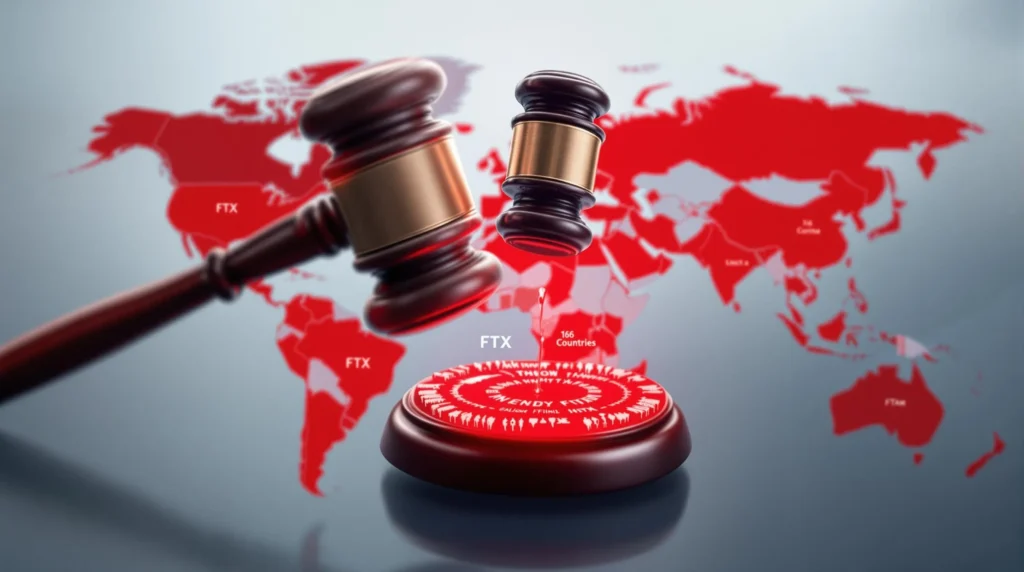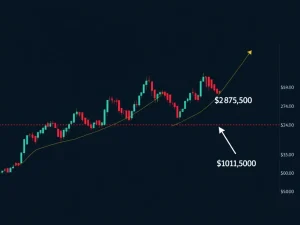Shocking FTX Claims Update: 163 Jurisdictions Deemed Ineligible for Distributions

In a potentially devastating blow to numerous FTX creditors worldwide, recent reports indicate that claims originating from a staggering 163 jurisdictions may be deemed ‘not eligible’ for distributions in the ongoing bankruptcy proceedings. This shocking development, brought to light by FTX creditor advocate Sunil Kavuri, has sent ripples of concern throughout the cryptocurrency community. Are you among those affected? Let’s delve into the details of this crucial update and understand its implications for FTX claims.
What’s the Shocking FTX Claims Ineligibility Update?
The unfolding FTX saga has taken another unexpected turn. According to a list shared by Sunil Kavuri, a vocal advocate for FTX creditors, a significant number of jurisdictions are now being categorized as ‘ineligible’ for receiving distributions from the bankruptcy estate. This list encompasses a diverse range of countries, including major players like Russia and China, alongside Egypt, Nigeria, and Ukraine, among many others. This revelation raises serious questions about the fairness and scope of the bankruptcy distribution process and leaves many wondering about the reasons behind such a broad exclusion.
Here’s a breakdown of what we know:
- Extensive List: A list circulating within the creditor community names 163 jurisdictions as ‘not eligible.’
- Advocate Confirmation: Sunil Kavuri, a prominent voice for FTX creditors, has shared and highlighted this list, adding weight to its credibility.
- Geopolitical Diversity: The jurisdictions span across continents and include countries with varying economic and political landscapes.
- Uncertainty for Claimants: For individuals and entities who filed cryptocurrency claims from these regions, the future of their recovery now hangs in the balance.
Who are the FTX Creditors Potentially Affected by This Decision?
The sheer number of jurisdictions flagged as ‘ineligible’ suggests a potentially vast number of FTX creditors could be impacted. While the exact criteria for this ineligibility remain unclear, the inclusion of countries like China and Russia – both significant players in the cryptocurrency space – indicates a potentially complex and far-reaching situation.
Consider the following potential scenarios:
| Jurisdiction Category | Examples | Potential Impact on FTX Creditors |
|---|---|---|
| Major Economies | China, Russia | Significant number of users and businesses potentially excluded, large volume of cryptocurrency claims at risk. |
| Developing Nations | Nigeria, Egypt, Ukraine | Individual investors and smaller businesses facing potential loss, exacerbating economic hardship in some cases. |
| Geopolitically Complex Regions | Various | Increased complexity in legal and bankruptcy distribution processes due to international relations and sanctions. |
It is crucial for anyone who has filed FTX claims, particularly those residing in or associated with the listed jurisdictions, to seek immediate clarification and legal counsel. Understanding the specific reasons for this ineligibility and exploring available options is paramount.
Why Might Cryptocurrency Claims from These Jurisdictions Be Ineligible?
The rationale behind deeming cryptocurrency claims from 163 jurisdictions ineligible is currently speculative, but several potential factors could be at play:
- Regulatory Compliance: FTX’s operations spanned numerous countries, each with its own regulatory framework regarding cryptocurrency and financial services. Compliance challenges across diverse legal landscapes could be a factor.
- Sanctions and International Law: Geopolitical factors, including international sanctions and varying legal systems, might complicate the bankruptcy distribution process to certain regions.
- KYC/AML Issues: Know Your Customer (KYC) and Anti-Money Laundering (AML) compliance discrepancies across different jurisdictions could pose hurdles in verifying and processing FTX claims.
- Operational Complexities: Managing distributions across a vast number of international jurisdictions presents significant logistical and legal complexities for the bankruptcy administrators.
- Strategic Decisions: While less palatable, there’s a possibility that this decision is a strategic move by FTX’s legal team to streamline the process or prioritize certain creditor groups over others.
It is important to note that these are potential explanations, and official clarification from FTX or the bankruptcy court is eagerly awaited. The lack of transparency surrounding this decision is adding to the anxiety and uncertainty among FTX creditors.
Navigating the Complexities of Bankruptcy Distribution in International Jurisdictions
The FTX collapse has highlighted the intricate challenges of handling bankruptcy distribution when a company operates globally. Dealing with international jurisdictions adds layers of complexity that domestic bankruptcies often avoid.
Key challenges in this scenario include:
- Varying Legal Systems: Bankruptcy laws and creditor rights differ significantly across countries. Harmonizing these disparate systems is a monumental task.
- Cross-Border Asset Recovery: Locating and recovering assets spread across multiple jurisdictions is a complex and time-consuming process, potentially impacting the pool of funds available for distribution.
- Communication Barriers: Language differences, time zone variations, and cultural nuances can hinder effective communication with FTX creditors in different regions.
- Enforcement of Judgments: Ensuring that bankruptcy court orders are recognized and enforced in international jurisdictions can be legally challenging.
- Fairness and Equity: Striving for a fair and equitable distribution process across all affected jurisdictions, while navigating legal and logistical hurdles, is a delicate balancing act.
Conclusion: An Urgent Call for Clarity and Action for FTX Creditors
The news that FTX claims from 163 jurisdictions may be ineligible for distribution is undoubtedly a major setback for countless FTX creditors. This shocking development underscores the volatile and often unpredictable nature of the cryptocurrency landscape and the critical importance of regulatory clarity and investor protection.
For those potentially affected, the immediate next steps are crucial:
- Verify Jurisdiction Status: Confirm if your jurisdiction is on the list of ‘ineligible’ countries.
- Seek Legal Advice: Consult with legal professionals experienced in international bankruptcy and cryptocurrency claims.
- Join Creditor Groups: Connect with other FTX creditors in your jurisdiction and globally to share information and strategies.
- Demand Transparency: Advocate for greater transparency from FTX and the bankruptcy administrators regarding the reasons behind this decision.
The situation remains fluid, and further updates are expected. Stay informed, stay vigilant, and take proactive steps to protect your interests in this ongoing and complex FTX saga. The fight for fair bankruptcy distribution for all FTX creditors is far from over.









